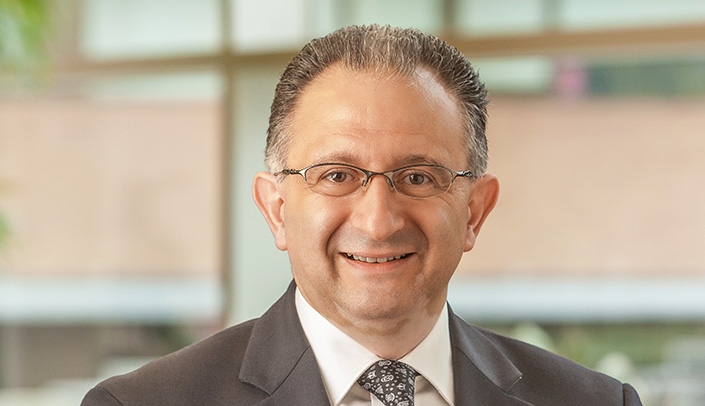Name: Marco Olivera-Martinez, MD
Medical school attended: Universidad La Salle (La Salle University) Mexico City, 1982-1987
Location of your residency/fellowship training: Instituto Nacional de Ciencias Médicas y Nutrición Salvador Zubirán (National institute of Medical Sciences and Nutrition Salvador Zubirán), Mexico City 1988-1995. Internal medicine between 1988-1992; gastroenterology between 1992-1995, UNMC, transplant hepatology, UNMC 1996-1998
What residency/fellowship program at UNMC are you serving as program director for: Transplant hepatology
Number of trainees: Two
How long have you been the program director: 10 years
What made you chose to become the program director? The opportunity to train the future experts in the field, the challenge of reaching and maintaining accreditation by ACGME and the chance of learning from each one of our trainees. We recruit fellows from the USA and around the world and the diversity of their background is a great opportunity to learn about science and about ourselves.
What challenges do you foresee in graduate medical education in the future? The rapid change in the epidemiology of some diseases, forcing the innovation in the medical training curriculum; the increasing need of supra-specialization in areas where technological and human resources might be limited; and the appearance of novel disease agents that might stress the health care systems and requiring prioritization of non-educational activities by the trainees.
What are the strengths of your training program? We are a referral center for the diagnosis and treatment of liver disease, including liver transplantation. In this regard, UNMC is a world-class liver transplant center and the most active in the four-state area. We receive referrals from around the country and around the world; this provides the trainee with experience in the approach and management of a large diversity of liver diseases. Our center transplants between 85 and 120 livers per year, giving the fellow ample exposure to the management of patients in the pre- and post-liver transplant settings. Our interaction with other medical and surgical specialties contributes to add value to the training by providing exposure to patients with liver manifestations of systemic diseases. All the members of our faculty have specific and unique research interests that will allow them to mentor the trainee in very specific topics in hepatology.
The diversity of our faculty is one of our greatest assets in education. Each one of our faculty members provide enriched experiences based on different strategies to achieve common goals.
List some accomplishments that you are proud of: The advanced training and education that we provide to our fellows is my greatest pride. Our transplant hepatology board exam passing rate is 100% so far. We have trained hepatologists who are now in leadership positions in highly reputed institutions around the country.
The scientific production of our team and the state of the art clinical and basic research in hepatology are two aspects to be proud of; the collaboration between trainees and faculty have resulted in scientific papers that have helped to the advancement of hepatology around the world. UNMC gathered the largest population of patients with hepato-renal syndrome after the re-definition of this condition in 2007. Our transplant hepatology service was the first in the country to use protease inhibitors for the treatment of recurrent hepatitis C after liver transplant just to give a couple of examples.
Personally, my proudest achievement is the success of all the fellows who have been trained since I joined UNMC.
Tell us three things about you that others may not know:
- I like sport motorcycles. I own a Kawasaki Ninja 650cc that I ride to work whenever possible; wintertime is out of question. I enjoy riding alone or in group and stop to eat local food in small towns.
- I collect dragons. I have been mesmerized by the ubiquitous presence of this mythological creature in different cultures around the world.
- One of the hobbies that I enjoy is mechanical and automatic watch repair. I started this hobby by changing the batteries to quartz watches, then when a “water resistant” watch fogged up after taking a shower with it, I decided to “check” the gaskets that indeed needed to be changed. Needless to say, the watch worked for a few days and then “died.” I have slowly progressed from changing straps, gaskets, crowns, rotors, testing for water resistance and time regulation with a mechanical timegrapher.

Dr. Olivera is a remarkable person and an outstanding program director. Congratulations, Marco!
Congratulations Dr. Olivera!
Congratulations Marco!
Dr. Olivera is an outstanding physician and dedicated educator.